

A Japanese robotics firm has shown that when it comes to walking, two-legged robots don't necessarily need to follow humans.
Looking a little like an under-dressed R2-D2, the bipedal robot was unveiled by Schaft - owned by Google's parent company Alphabet - at the recent New Economic Summit in Tokyo.
Co-founder and boss of Schaft, Yuto Nakanishi, introduced the as-yet unnamed robot as it waddled on stage, stiff-legged and self-assured, demonstrating its locomotion without bending its leg joints.
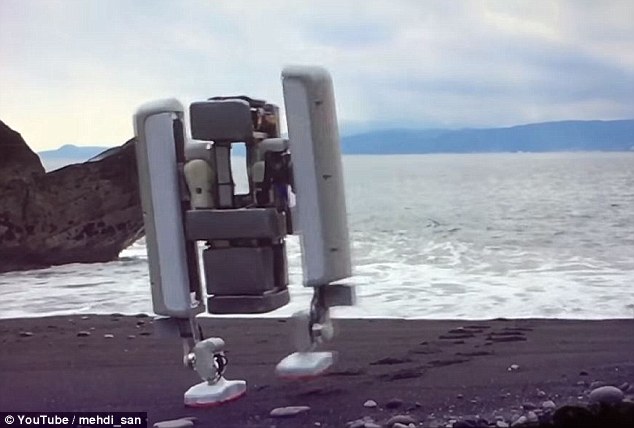
Alphabet-owned Japanese robotics firm Schaft unveiled its new two-legged robot in Tokyo on Friday. The as-yet unnamed prototype walks without bending its leg joints and is reportedly aimed at helping society by carrying heavy loads. A video at the conference demonstrated the robot's capabilities (still pictured)
Mimicking the complex movements involved in human motion has long-been a challenge for bipedal robotics experts, owing to the countless minor adjustments we make as we walk.
But Schaft's robot has opted for a different approach, doing away with the complex knee joint and opting for sliding mechanisms in the top of the legs, with stabilising load-bearing ankle joints.
In an eerie display of its capabilities, the bipedal droid is seen self-stabilising after stepping on a pole in a demonstration video, as well as lifting weights in the gym and even taking a lonely stroll along a shingle beach.
The robot can also be seen ascending and descending sets of stairs without assistance.

The bipedal prototype (pictured) can reportedly carry 60kg (132 lb) of weight, and is 'aimed at helping society by helping to carry heavy loads
The Japanese robotics firm was bought by Alphabet in 2013, just a year after it was established.
The only footage of the robot in action emerged from an attendee at the NEST 2016 conference, as did a handful of tweets and images.
According to Tokyo-based tech writer Tim Hornyak, the bipedal prototype can carry 60 kg (132 lb) of weight, it has no name yet, can tackle uneven terrain and is 'aimed at helping society by helping carrying heavy loads'.
Schaft has worked with Alphabet's Boston Robotics to advance bipedal robots as part of the Darpa robotics challenge.
The Japanese firm now sits under Alphabet's secretive X division, formerly known as Google X.

Looking a little like an under-dressed R2D2, the new bipedal robot was unveiled by Schaft Inc - owned by Google parent company Alphabet - at the recent New Economic Summit in Tokyo
According to recode.net a rep for Alphabet's X, said: 'The team was simply delighted to have a chance to show their latest progress.'
'As with all of the robotics teams that recently moved from Google to X, we're looking at the great technology work they've done so far, defining some specific real-world problems in which robotics could help, and trying to frame moonshots to address them.'
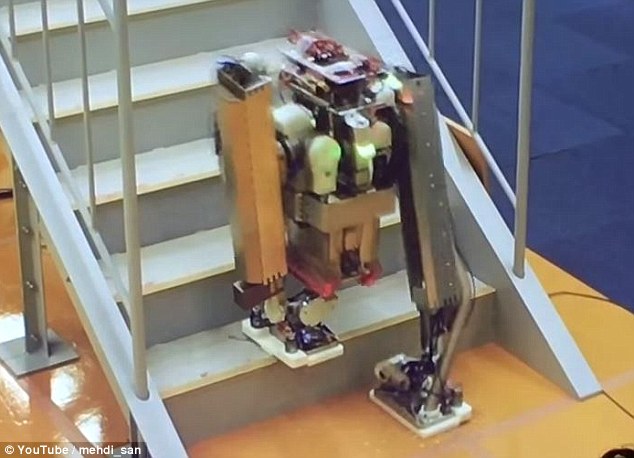
The unnamed robot can ascend and descend sets of stairs, without assistance (still pictured)
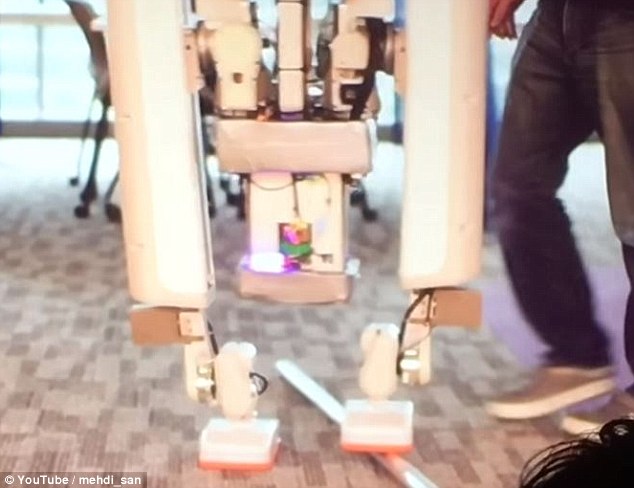
Similar to robots developed by Google-owned Boston Dynamic, the bipedal prototype is self-stabilising and is able to correct itself when standing on uneven surfaces, such as a metal bar (still pictured)
Google announced last month that it is to sell Boston Dynamics, the US firm behind the running robot dog and the bipedal Atlas robot.
The California-based internet giant acquired Boston Dynamics in late 2013 along with several other robotics firms, in a deal set up by Andy Rubin, the former head of the Android division, who left the company in October 2014.
It is believed the firm was too focused on long-term projects to fit in at Google.
Leaked emails also show that PR staff at the search giant were concerned that the humanoid robots would put the firm in a bad light if they were shown to be able to replace humans in some jobs.
The firm's latest version of its humanoid robot can now get up easily on its own if it falls. The Atlas robot was widely derided at the recent 'robolympics' after falling repeatedly and needing a crane to get up.
It was recently reported that the firm could be snapped up by Amazon or Japanese car manufacturer Toyota.
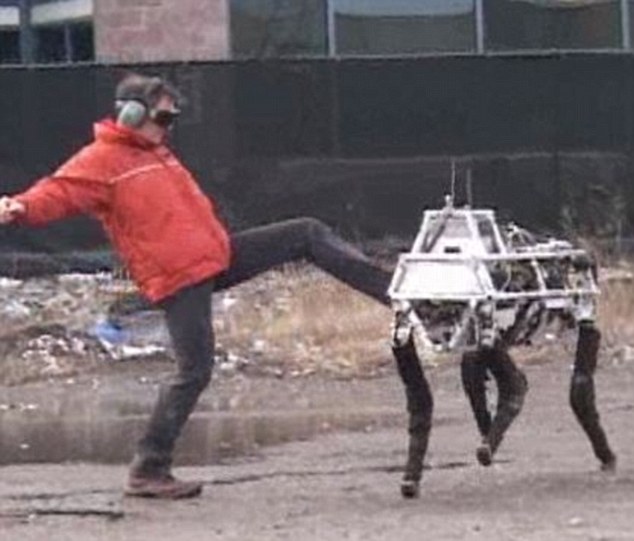
Schaft Inc's prototype is able to self-stabilise, similar to robots developed by Google-owned Boston Dynamics, which are able to keep their balance when forcibly shoved from the side (pictured). Google announced last month that it is set to sell Boston Dynamics,reportedly due to differences in aims for the robots
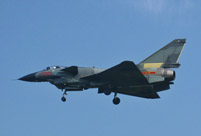 The evolution of J-10 fighter
The evolution of J-10 fighter Top 10 Asian beauties in 2016
Top 10 Asian beauties in 2016 Train rides through blossoms
Train rides through blossoms North Sea Fleet conducts drill in West Pacific Ocean
North Sea Fleet conducts drill in West Pacific Ocean Breathtaking aerial photos of tulip blossoms in C China
Breathtaking aerial photos of tulip blossoms in C China Horrific: Pit swallows 25 tons of fish overnight
Horrific: Pit swallows 25 tons of fish overnight Police officers learn Wing Chun in E. China
Police officers learn Wing Chun in E. China Charming models compete in super model contest in Beijing
Charming models compete in super model contest in Beijing Beauties wearing Tang dynasty costume pick tea leaves
Beauties wearing Tang dynasty costume pick tea leaves Top 20 hottest women in the world in 2014
Top 20 hottest women in the world in 2014 Top 10 hardest languages to learn
Top 10 hardest languages to learn 10 Chinese female stars with most beautiful faces
10 Chinese female stars with most beautiful faces China’s Top 10 Unique Bridges, Highways and Roads
China’s Top 10 Unique Bridges, Highways and Roads The reality of VR shopping
The reality of VR shopping War photographer and mother
War photographer and mother Why does the Western media hate the GFW so much
Why does the Western media hate the GFW so much The 15 vital questions couples should ask before marriage
The 15 vital questions couples should ask before marriageDay|Week